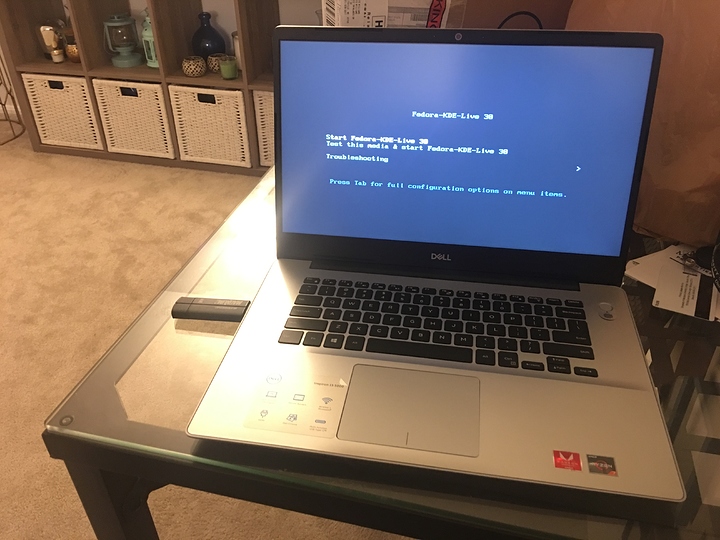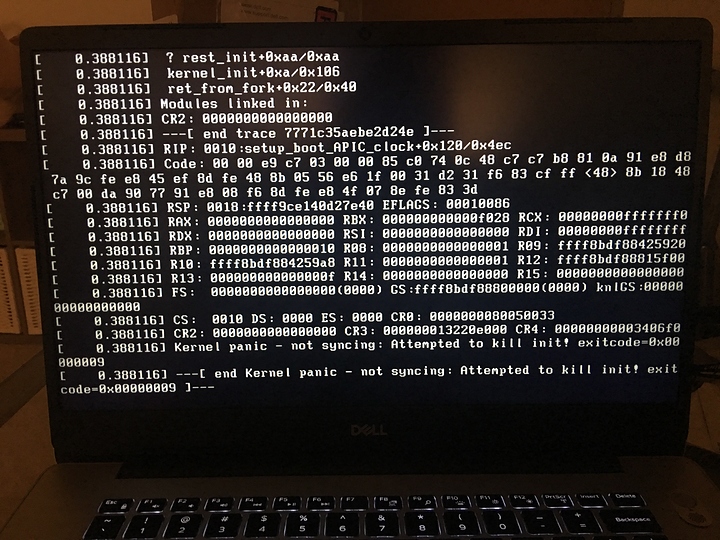Got pulled it seems.
Some bugs yeah. If you boot in to another os and init the rng you can reboot into Linux fine haha. Prolly why automated testing didn’t catch it
I think AMD said that they mostly just tested with Ubuntu 18.04
I bought a Dell Inspiron 5585 (Ryzen 3700u.) It runs great with Windows, which is no small feat, so I was chomping at the bit to Install the KDE spin of Fedora. I tried disabling TPM/Secure Boot and enabling all the legacy boot options along with creating the Linux Live USB with every possible combination of MBR/GPT and ISO/DD only to receive a kernel panic every time. I tried the same stuff with Linux Mint Cinnamon and got the same results. I hope this gets fixed soon so I can use my laptop. I refuse to use Windows unless I absolutely have to for work/school. 
I bought a Dell Inspiron 5585 (Ryzen 3700u.) It runs great with Windows, which is no small feat, so I was chomping at the bit to Install the KDE spin of Fedora. I tried disabling TPM/Secure Boot and enabling all the legacy boot options along with creating the Linux Live USB with every possible combination of MBR/GPT and ISO/DD only to receive a kernel panic every time. I tried the same stuff with Linux Mint Cinnamon and got the same results.
You might need some kernel boot parameters. The E595 thread might help:
@SuqMadique I would try Linux Mint 19.1 again, It should work, I think Linux Mint is based on Linux Kernel 4.18, which everyone is saying does work. You might want to try a different USB stick when I tried to install Linux Mint on my laptop two months ago I used a different USB stick that did the trick for me.
Thanks! I’ll check it out.
Ah, looks like you need a fix from the E585:
ivrs_ioapic[32]=00:14.0
It may not be those specific values but it’s definitely an APIC issue.
I got my Lenovo 330S with Ryzen initially to boot with the kernel parameter
iommu=soft
Later got it to work with the
ivrs_ioapic[32]=00:14.0
But when booting Fedora for some reason none of the USB ports work. Not been able to track down that problem yet, though using iommu=soft works. Ubuntu crashes randomly when scrolling in a browser though, soo have been using Fedora mostly.
Edit: USB still borked on Fedora 29 with the iommu=soft option, I remembered wrong. Still have to boot Ubuntu or Windows if I want USB.
xhci_hcd 0000:04:00.3: Error while assigning device slot ID
xhci_hcd 0000:04:00.3: Max number of devices this xHCI host supports is 64.
usb usb2-port2: couldn’t allocate usb_device
xhci_hcd 0000:04:00.3: Error while assigning device slot ID
xhci_hcd 0000:04:00.3: Max number of devices this xHCI host supports is 64.
usb usb2-port2: couldn’t allocate usb_device
Because of this, I was forced to install Fedora 29 onto my system with the Ryzen 3800X. However Fedora 29 had an update to a newer kernel version resulting in a locked up state. Yay me. lol
So my install began with kernel 4.18.16-300.fc29. During some updates, it ended up being 5.1.18-200.fc29. Thus resulting in the system locking up on boot (Crosshair VII Hero (Wi-Fi) had error code E8, which is for S3 Resume Failed), my screen stayed just lit with nothing showing. Fortunately GRUB allowed me to boot the OS with the older kernel version.
However, upon manually upgrading the kernel to the updates-testing repo, I’ve successfully booted the system with 5.1.19-200.fc29. https://bodhi.fedoraproject.org/updates/FEDORA-2019-43a707d14f
I did go back to try kernel 5.1.18-200.fc29, but it failed every time. So I feel confident in this issue being fixed pretty quickly for both Fedora 29 and 30.
Especially since 5.1.19-300.fc30 for Fedora 30 was put out in testing at the same time as the one for Fedora 29: https://bodhi.fedoraproject.org/updates/FEDORA-2019-9d3fe6fd5b
It’s systemd. If you can keep old systemd it’s fine. Also if the CPU rng has enough entropy it will boot fine (lulz).
I just tried the latest Kali weekly image and it booted nicely! I just completed my 3600X build yesterday and completely panicked because I thought this had been resolved… not sure what fairy tale land I’d been living in, but nevertheless, at least I can use Kali!
Just looking into this right now; my motherboard gets no update yet, so I want a solution now.
From reading changelogs, I guess following packages work:
- systemd 240-6ubuntu5.1pop0 (current Pop! 19.04 ISO)
- systemd 240-6ubuntu5.2 (only Disco repository)
Now I only would have to respin/exchange just this tiny little bit in Ubuntu 19.04 ISO…
or use network installer (which is quite easier for once)
Asrock is first out the gate with BIOS updates on 2 of their mobos (both X570 and B450) to fix the RDRAND bug.
The crazy Agesa version number remains apparently, to cause maximum confusion (COMBO 1.0.0.3ABB, which mobos will probably just list as 1.0.0.3, same as current BIOSes)
https://www.asrock.com/support/index.asp?cat=BIOS
All I want is for ASUS to fix the DRAM Boot Voltage issue. It’s really screwing up DOCP on ASUS boards.
I’m using Kernel 5.0.0-21-generic with my 3600 right now on a B350 ITX gigabyte board without any issues. I thought I would need kernel 5.1 at least but it seems not…
Oh there is 1 issue, I can’t get CPU temps.
k10temp hasn’t been updated yet. Patches are still waiting to be merged with the IDs for Ryzen 3000.
https://www.phoronix.com/scan.php?page=news_item&px=AMD-Zen2-k10temp-Patches
I need clearcpuid=514 in boot options to avoid random crashes in games. Could only affect steam game users I dunno. There should be a proper fix coming sometime down the line.

